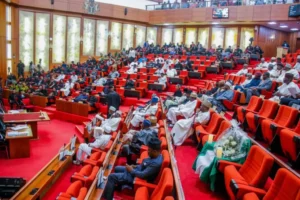The Senate has raised concerns over the increasing brain drain in Nigeria’s tertiary education sector, particularly in public universities.
During a session on Tuesday, the Senate urged the Federal Government to develop strategies to tackle the issue, which coincides with a looming strike by the Academic Staff Union of Universities (ASUU) over poor welfare and other challenges affecting university operations.
Alarming statistics indicate that over 50% of academic staff in public universities have left their positions, with the trend expected to worsen.
Senator Anthony Ani-Okorie (APC, Ebonyi-South) highlighted the issue in a motion, prompting a call for government action to address the problem. After a debate, the Senate directed the Minister of Finance, Mr. Wale Edun; the Minister of Education, Hon. Tahir Mamman; and the Tertiary Education Trust Fund (TETFUND) to create specific measures to curb brain drain.
Many senators argued that brain drain is a reflection of Nigeria’s struggling economy and the lack of local opportunities for skilled professionals, noting that it would be difficult to legislate against the trend or prevent individuals from seeking opportunities abroad.
However, Ani-Okorie, a professor of agriculture and former university lecturer, emphasized the significant gaps left by the migration of talent from the country’s universities, calling for deliberate action to address the issue.
The Senate passed a resolution urging the government to increase budgetary allocations to tertiary education in the 2025 budget and resolve pending agreements with academic unions.
Ani-Okorie’s motion stated, “The Senate notes the significant outflow of highly educated professionals, particularly in academia, seeking better working conditions abroad, exacerbating the skills gap and hindering the country’s economic development.

“Further notes that many Nigerian universities are operating with less than 50% of their required academic staff, as reported by the National Universities Commission (NUC).
“Recognizes that Nigerian university lecturers receive some of the lowest salaries globally, as their remuneration has not been reviewed in over 15 years, rendering it inadequate for the country’s current economic realities.
“Also notes that universities in other West African countries offer better working conditions than Nigerian institutions, which is a major concern.
“Worried that the ongoing loss of experienced faculty members is negatively impacting the quality of education, reducing the effectiveness of teaching, learning, and mentorship for students in our higher institutions.
“Further worried that brain drain has reached unprecedented levels due to the country’s economic situation, threatening the survival of higher education, particularly in critical fields like engineering, medicine, and the sciences, which are vital for Nigeria’s socio-economic development.”
In other proceedings on Tuesday, the Senate moved to strengthen the role of the Securities and Exchange Commission (SEC) as the regulator of Nigeria’s capital market by passing the “Investments and Securities Bill 2024” for second reading.
Senator Osita Izunaso (APC, Imo) led the debate on the bill, which seeks to repeal the 2007 Investment and Securities Act and enact updated legislation. The bill, sponsored by Senate Leader Senator Opeyemi Bamidele and co-sponsored by Izunaso, aims to regulate the capital market, promote capital formation, protect investors, and reduce systemic risks.
Izunaso explained that the primary goal of the bill is to align Nigeria’s capital market regulation with global standards by providing an innovative regulatory framework.
Senators Isa Jibrin (APC, Kogi) and Adetokunbo Abiru (APC, Lagos) supported the bill. Jibrin stated, “We’ve faced challenges in defining the specific duties of the SEC to ensure the proper functioning of the Nigerian capital market. This amendment is necessary to ensure SEC compliance with global best practices.”
Abiru added that the bill would improve both discipline and efficiency in the capital market while enhancing the SEC’s capacity as a regulator.




